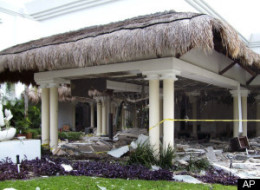 The Associated Press:
The Associated Press: Playa del Carmen, Mexico — A powerful explosion likely caused by an accumulation of gas killed 7 people, including five Canadian tourists, on Sunday at a large resort hotel on Mexico's Caribbean coast, authorities said.
Two Mexican employees of the sprawling, 676-room hotel Grand Riviera Princess hotel in Playa del Carmen, south of Cancun, were also killed in the blast, said Francisco Alor, attorney general of Quintana Roo, where the resorts are located.
Two other Canadians suffered severe injuries and were listed in critical condition. Ten others, including two U.S. citizens and eight Mexican employees of the hotel, suffered less serious wounds and were listed as stable.
Alor described a horrific scene in which the floor of the building was basically hurled through the ceiling by the force of the explosion, blowing out windows and sending fragments of aluminum window and ceiling panels frame over a wide area.
"Everyone said their hotel room shook. The glass at neighboring restaurants all cracked and blew out. The tiki hut that was in the area, that was on fire," said James Gaade of St. Catharines, Ontario, who was walking on the beach when he heard a loud explosion and saw smoke coming from the resort's premium platinum lounge. "There was a large crater in the area, debris."
Alor said the dead include four men and a woman, but offered no further information on the victims. Playa del Carmen Civil Defense director Jesus Puc said the Canadian fatalities included a nine-year-old boy.
A statement from Canada's Foreign Affairs and International Trade department said that one Canadian was confirmed killed, adding "we have received unconfirmed reports that three Canadian citizens are missing and seven are injured. No further information is available at this time."
"On behalf of all Canadians, the Government of Canada extends its sympathies to the families and friends of those who lost their lives."
The resort was hosting a large number of Canadians, including at least one wedding and a company vacation. Gaade estimated that 50 to 70 percent of the guests at the resort were Canadians.
The blast occurred on the ground floor of one of a dozen or so buildings that make up the sprawling hotel, and left a crater a yard (meter) deep.
It also blew out windows and hurled pieces of paving, glass and aluminum about 50 yards (meters) onto the palm-fringed lawn of the compound.
The area, next to the turquoise waters of the Caribbean, was cordoned off and about 30 Mexican army soldiers stood guard around the hotel.
Alor and other officials, including Puc and local Red Cross director Ricardo Portugal, said the initial investigations suggest the gas that exploded beneath the building was apparently not for cooking, but rather a mix of gases from a nearby swamp.
Alor told local media that investigations were under way to see if the hotel building, which sat on a concrete pad on a swampy area near the beach, had been properly constructed.
"The report suggests an accumulation of gases produced by decomposing organic material in the subsoil, and this gas produced the explosion," Alor said.
"Expert examiners and civil defense personnel will have to determine if the underground space filled with swampy water that remained in this zone when the building was constructed four years ago, could have generated this type of gases," he said.
Officials said no gas lines were located in the area where the blast occurred.
Pete Travers, program director of 570 News Radio in Kitchener, Ontario, was at the hotel with a large group of Canadians from nearby Waterloo. He said all members of his group were accounted for.
Travers recalled hearing a huge crash before he went down for breakfast. He stepped into the hallway to find people running from the blast site as word of an explosion rippled across the resort.
"There was quite a lot of chaos," Travers said. He and a few other guests rushed to grab deck chairs from the pool area to use as makeshift stretchers.
No comments:
Post a Comment
Note: Only a member of this blog may post a comment.